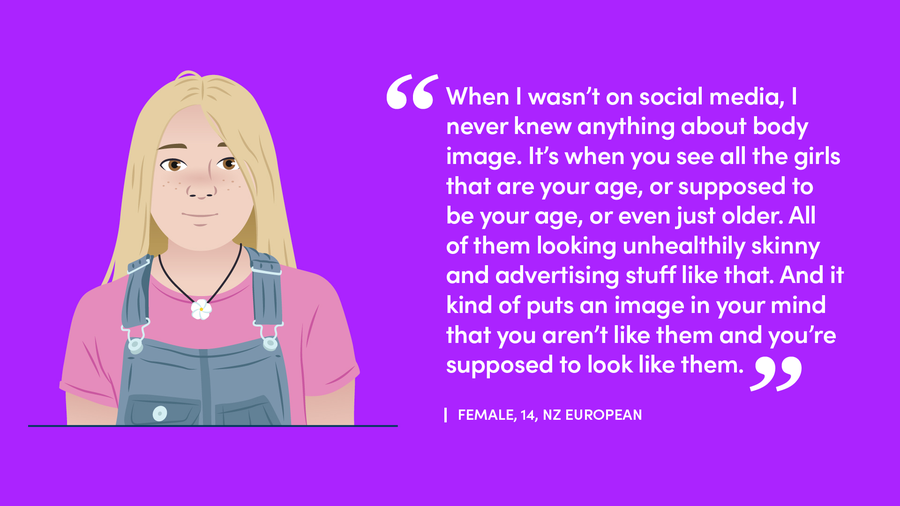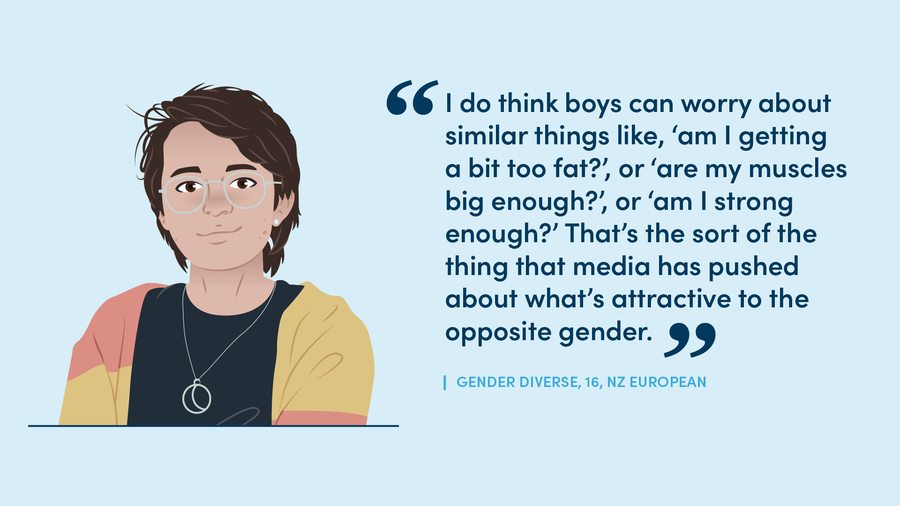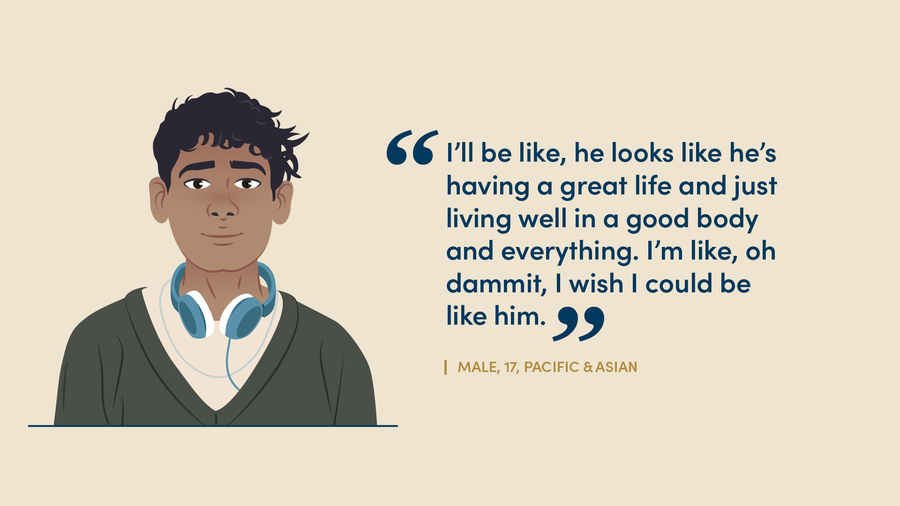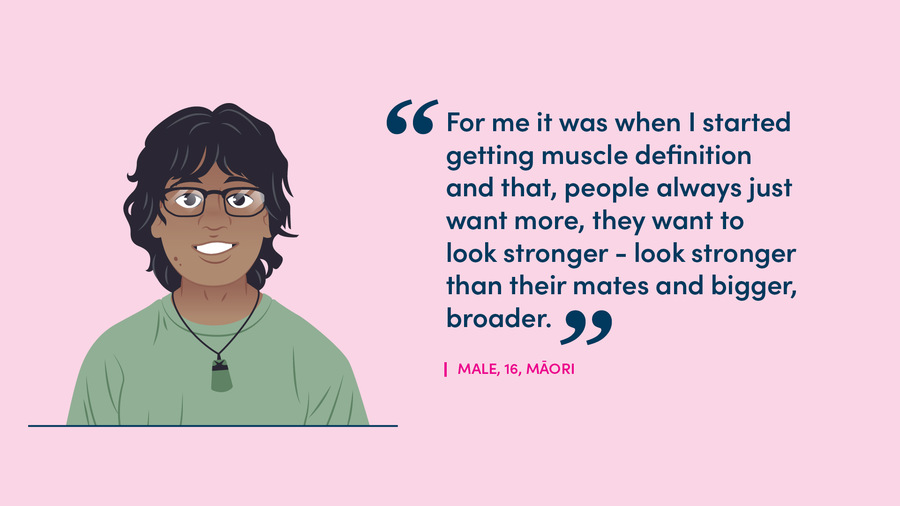New Body Image Report Highlights the Missing Voice of Youth
Valuable insights about body image gained from research on experiences young New Zealanders have online will be used to create safer and more supportive environments in those spaces.
The Classification Office and Netsafe, New Zealand’s online safety organisation, commissioned research to speak with young New Zealanders about their experiences with online content and its impact on body image. The resulting Body Image Report is being released today as part of Netsafety Week 2024 (28 July to 2 August).
They key takeout from the research is that rangatahi said social media and other online content can have a significant influence on their wellbeing and self-perception. They also said that while some online content promotes unrealistic ideas about what is ‘beautiful’ or ‘attractive’ which can negatively impact younger viewers, social media can also foster positive body image by promoting diversity and challenging traditional ideals as young people grow up and seek to find their place and their people.

Chief Censor, Caroline Flora, explained the drivers for developing the research. “We want to encourage and empower whānau to understand what young people are experiencing online and have open conversations. We also recognise that there is some good messaging around health and wellbeing online.”
Flora said that because experiences online are shaped by personal context, social circles, and tailored algorithms, this presents significant challenges for regulators like the Classification Office and safety organisations such as Netsafe.
“Critical thinking and open conversations are key to preventing and addressing harm in this context. Online content can be entertaining, informative and fun, but it can also do harm – that’s why we carried out this research alongside Netsafe.”
Netsafe CEO Brent Carey says there are a number of NZ and international groups lobbying for
platform, system and behaviour changes to ‘protect’ young people as technology progresses.
“When age is reported to Netsafe in our online harm reports, on average 12.67% feature teenagers as the target of the online harm.* So it is understandable that we are concerned about the impacts of online experiences. However, the youth voice has largely been missing from this discourse. It is vital the views of young people are heard because their experience growing up in a digital age is different to those in positions of power. Positive role modelling by parents rather than strategies based on fear is what they are asking for, and so that is what we are aiming to encourage.”
Carey went on to say that when parents are asked what their top concerns are, they describe the same worries parents have expressed since the internet arrived in homes – bullying, stranger danger and inappropriate content access.
“But if we listen to our young people, we find out that this is not what they feel has the biggest impact on them. It is issues like body image, self-esteem, comparison culture, and deciphering real from fake. This is the disconnect between what we think, and what actually impacts young people in the long term.”
The research also found that as young people mature, the very platforms they struggled on can become a positive force in their lives.
“It’s where they find their people and express their true selves. Our job as adults is to respectfully walk alongside young people, meeting them where they are at, lobbying for the changes they have asked for, like more effective platform blocking tools - so that when they say they don’t want to see more of something, they can trust the platform to listen to them - and ensuring we create the supportive spaces they are asking for, to help them walk positively into their digital lives.”

The full report and summary of key findings are available now on the Classification Office website. The report’s key findings are also summarised below.
What did young people say about their online experiences?
Key findings in the report
- Young people are seeing and engaging with a variety of body image content, often in their early teens, and social media plays an important role as they get older.
- It’s common for young people to engage with fitness, gym, or dieting content.
- Young people think the influence of body image content is a big issue.
- Young people use social media to express themselves and connect with friends, but they face significant challenges managing unwanted and harmful content, and they said it can be hard to avoid. Algorithms sometimes make it hard to get positive and reliable information.
- Even when they realise that some content isn't real, it can still affect how they feel about their bodies.
- Body image content affects all young people, but in different ways - personal experience, self-confidence, and emotional state all have an impact. However, the most common theme was the belief that online content is adding to pressures around body image and comparing themselves to others.
- Body image content affects everyone, but gender plays a key role. Boys often engage with fitness-related content while girls often see unrealistic beauty standards and dieting tips. Trans and gender diverse individuals use social media to find support for their gender identity but often face unreliable content and negative comments.
- The impact of body image content can be both positive and negative.
- Some describe seriously negative experiences when they were younger, but now engage with body image content in ways that help them feel positive and comfortable with their appearance.

Where to from here?
What young people want
- Young people often discuss body image and online content in general terms but struggle to have deeper conversations about their personal feelings and concerns.
- Young people often casually discuss body image and online content, like workout routines and fashion trends, but they feel uncomfortable talking about the negative impacts of body image content for fear of being judged or misunderstood.
- Young people want more understanding and supportive dialogue from adults. They feel that adults often misunderstand their experiences and prefer discussions that are empathetic, validating and less critical
- Young people want better educational resources and support. They want schools to include more detailed and engaging lessons on healthy body image but when it comes to group presentations, they prefer personalised, one-on-one counselling sessions to discuss sensitive topics privately and address their individual needs.
- Both organisations now want to share these findings with young people, parents and schools, for their benefit. The issues and suggestions raised by the research participants will be used to inform new harm prevention and remediation support materials for young people in relation to social media, body image and wellbeing.

*Netsafe’s helpline does not force age to be disclosed and so this is based on voluntary disclosure. The real figures may be higher.
---- Ends ----
For further information call or email
For Netsafe: Caro Gibson I Consultant I Boyd Public Relations Ltd I M: 021 288 7023 I E: caro@boydpr.co.nz
For Classification Office media enquiries please contact:
E: information@classificationoffice.govt.nz I M: 022 526 3156
About Netsafe
Netsafe is an independent charitable organisation supporting people in Aotearoa to have safe and positive online experiences. We keep people of all ages safe online by providing free support, advice, and education. You can find our published research on the Netsafe Lab area on our website. These research outputs and data insights are used to support Netsafe’s education and operations teams by boosting the resilience of our online safety services and products.
The focus for Netsafety Week is to provide practical tools and harm prevention support to enable New Zealanders to get the most benefit – and the least harm – while living their digital lives. Raising the profile of online safety for a dedicated week reflects Netsafe’s ongoing online safety work, which takes place 365 days a year.
Visit netsafe.org.nz or phone 0508 Netsafe for free resources or to report incidents of online harm.
About The Classification Office – Te Mana Whakaatu
The Classification Office is an independent Crown entity responsible for classifying material which may need to be restricted or banned. This can include films, books, video games and online content. The Office can restrict or ban content that promotes crime, terrorism or violence. The Office also conduct research and produce evidence-based resources to promote media literacy and enable New Zealanders to make informed choices about what they watch.
The Classification Office’s media fact sheet.
Visit www.classificationoffice.govt.nz for more information.
About the Body Image Report
- The research was carried out independently by Research First.
- Data was collected through semi-structured face-to-face interviews in clinics, schools, and online. Each interview lasted approximately 45 to 90 minutes.
- Research First facilitated a Research Advisory Group consisting of experts from various fields, including Māori, Pacific, Asian, and LGBTQI+ cultural and research advisors, as well as clinical advisors from Te Whatu Ora Te Toka Tumai Auckland Tupu Ora Regional Eating Disorder Unit.
- The research involved 58 young people aged 14-17 years from across New Zealand, including metro-urban, other urban, and rural areas. The sample was inclusive of rangatahi of all genders, ethnicities, ages, sexualities, priority groups – migrants, neurodiverse people, and those with disabilities – and locations. Of the 58 respondents, 10 were most affected by serious health issues relating to body image (including eating disorders) from Te Whatu Ora Te Toka Tumai Greenlane Clinical Centre (clinical rangatahi).
- Non-clinical rangatahi were given the option of either face-to-face interviews or online, while all clinical interviews were face-to-face.
Subscribe to our news
Stay up to date with news from the Classification Office.


